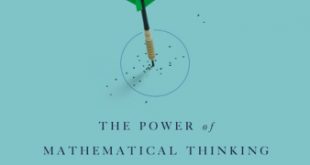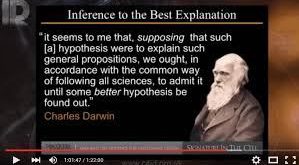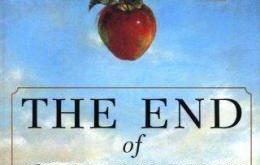Is 0.999… = 1? What is 0.999 …, really? Is it 1? Or is it some number infinitesimally less than 1? The right answer is to unmask the question. What is 0.999 …, really? It appears to refer to a kind of sum: .9 + + 0.09 + 0.009 + 0.0009 + … But what does that mean? That pesky ellipsis is the real problem. There can be no controversy about what it means to add up two, or three, or a hundred numbers. But infinitely many? That’s a different story. In the real...
Read More »Diversity bonuses — the idea
Diversity bonuses — the idea [embedded content] If you’d like to learn more on the issue, have a look at James Surowiecki’s The Wisdom of Crowds (Anchor Books, 2005) or Scott Page’s The Diversity Bonus (Princeton University Press, 2017). Advertisements
Read More »The evidential sine qua non
The evidential sine qua non Advertisements
Read More »The poverty of deductivism
The poverty of deductivism The idea that inductive support is a three-place relation among hypothesis H, evidence e, and background factors Ki rather than a two-place relation between H and e has some drastic philosophical implications, which partly explains why philosophers of science have been so reluctant to endorse it. The inductivist program … aimed at doing for inductive inferences what logicians had done for deductive ones … Once the Ki enter the...
Read More »Scientific realism and inference to the best explanation
Scientific realism and inference to the best explanation In a time when scientific relativism is expanding, it is important to keep up the claim for not reducing science to a pure discursive level. We have to maintain the Enlightenment tradition of thinking of reality as principally independent of our views of it and of the main task of science as studying the structure of this reality. Perhaps the most important contribution a researcher can make is to...
Read More »Abduction — the induction that constitutes the essence of scientific reasoning
Abduction — the induction that constitutes the essence of scientific reasoning In science we standardly use a logically non-valid inference — the fallacy of affirming the consequent — of the following form: (1) p => q (2) q ————- p or, in instantiated form (1) ∀x (Gx => Px) (2) Pa ———— Ga Although logically invalid, it is nonetheless a kind of inference — abduction — that may be factually strongly warranted and truth-producing. Following the general...
Read More »The problem of extrapolation
The problem of extrapolation There are two basic challenges that confront any account of extrapolation that seeks to resolve the shortcomings of simple induction. One challenge, which I call extrapolator’s circle, arises from the fact that extrapolation is worthwhile only when there are important limitations on what one can learn about the target by studying it directly. The challenge, then, is to explain how the suitability of the model as a basis for...
Read More »The arrow of time in a non-ergodic world
The arrow of time in a non-ergodic world For the vast majority of scientists, thermodynamics had to be limited strictly to equilibrium. That was the opinion of J. Willard Gibbs, as well as of Gilbert N. Lewis. For them, irreversibility associated with unidirectional time was anathema … I myself experienced this type of hostility in 1946 … After I had presented my own lecture on irreversible thermodynamics, the greatest expert in the field of thermodynamics...
Read More »Hur skiljer man på vetenskap och trams?
Hur skiljer man på vetenskap och trams? Emma Frans’ med rätta prisbelönta bok Larmrapporten är en rolig, kunnig och ack så nödvändig uppgörelse med allehanda pseudo-vetenskapligt trams som sköljer över oss i media nuförtiden. Inte minst i sociala media sprids en massa ‘alternativa fakta’ och nonsens. Även om jag varmt rekommederat studenter, vänner och bekanta att läsa boken, kan jag dock inte låta bli att här påpeka att det finns en liten svaghet i boken....
Read More »Mainstream economics gets the priorities wrong
Mainstream economics gets the priorities wrong There is something about the way economists construct their models nowadays that obviously doesn’t sit right. The one-sided, almost religious, insistence on axiomatic-deductivist modelling as the only scientific activity worthy of pursuing in economics still has not given way to methodological pluralism based on ontological considerations (rather than formalistic tractability). In their search for model-based...
Read More » Heterodox
Heterodox









